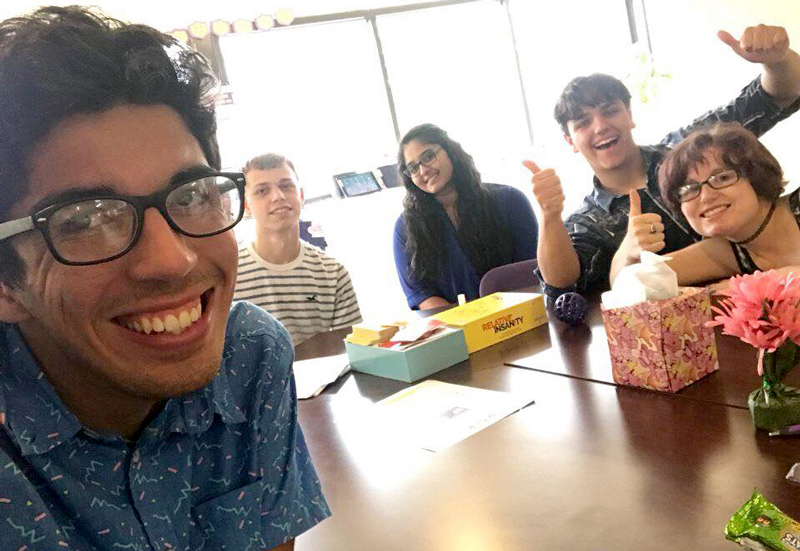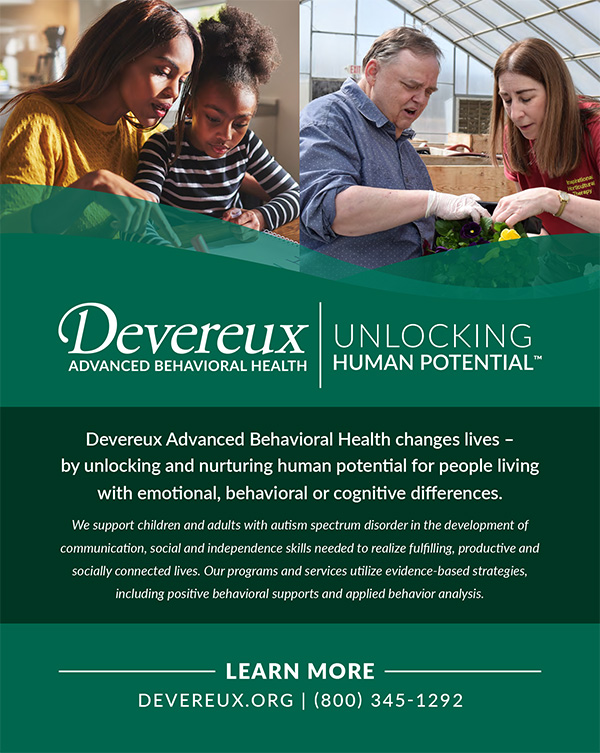For autistic individuals, success in college lies in an effective transition plan that acknowledges and addresses the increased challenges they will face as college students. According to a national study, 34% of autistic students who qualified for a post-secondary education program attended such a program and fewer than 40% completed their degree (Shattuck, 2012). For college-capable autistic students, academic challenges alone do not present the greatest barrier to success. Rather, it is the balancing act of the college setting that demands skills across the areas of education, socialization, and independent living (Van Hees et al., 2018). While many students report feeling academically supported in college, they indicate a lack of support in other non-academic areas (e.g., socially, emotionally) that impede their overall success (Cai & Richdale, 2016; Van Hees et al., 2015).

Students enrolled in West Chester University’s Dub-C Autism Program (D-CAP) provide peer mentoring for HYPE
As autistic students pursue higher education, instruction needs to be designed to teach the specific skills they will need to be successful in college, including the following recommendations:
- Teach Self-Determination Skills: As early as possible, students should learn to be actively engaged in their own Individualized Education Plan process to foster self-advocacy skills. In college, access to support is dependent on students disclosing their diagnosis, registering with disability services, and communicating with instructors to ensure access to necessary accommodations. Many autistic students do not proactively link with supports or only disclose when their stress exceeds their ability to cope (Cai & Richdale, 2016).
- Take a Collaborative Approach: Transition planning requires a collaborative approach between students, families, schools, and other supports (Nuske et al., 2019). Person-centered futures planning processes (Schall et al., 2014) can help teams create a systematic plan to assist students in identifying their own goals and then develop comprehensive and individualized supports.
- Think Beyond Academics: Autistic college students especially struggle with skills related to executive functioning, social communication, sensory processing, independent living skills, and the need for structure and routine (Cai & Richdale, 2016; Van Hees et al., 2015). School transition teams must assess and teach these critical skills to better prepare autistic students for holistic college success.
- Support Health and Wellness: Autistic students often face increased mental health concerns (e.g., anxiety, depression, loneliness) while trying to meet college demands (Cai & Richdale, 2016). Students need support in linking to healthcare and mental health services (Fernandes et al., 2021). Teams should identify and plan for barriers in accessing these supports and help the student create a plan for how to cope with stress.
- Identify a Coach: Many students preferred one designated person to support them across life domains and to provide individualized coaching (Van Hees et al., 2015). Coaches can provide more immediate and individualized performance feedback as students learn skills in naturally occurring routines and environments.
- Provide Families with Information: Caregivers often report barriers with privacy legislation and institutional polices at college, even when student’s welcome caregiver support (Nuske et al., 2019). Caregivers and students need guidance surrounding the changes in regulation between high school and college (e.g., IDEA versus ADA, FERPA). Caregivers also need education surrounding common challenges of the autistic college student that may lead to struggles for even the most academically advanced individual.
- Teach Independence: Parents and students often experience tension during transition years as families navigate how to provide enough support while also promoting independence and autonomy (Van Hees et al., 2018). Families should be prepared to cope with their own discomfort during this time in lieu of denying their child of critical learning experiences (e.g., spending the night away from home, taking public transportation, etc.). It is important that families safely support their children in learning these skills independently through relatively low-risk opportunities beginning in childhood to introduce the natural consequences of choices.
- Find a Good College Fit: Students and their teams should consider a wide variety of college characteristics (e.g., size, location, campus support programs, accepting community, etc.) (Zeedyk et al., 2016). Students should be exposed to college experiences early so that they can identify an environment that best fits their needs.
Transition teams can also support students in enrolling in comprehensive transition programs for the college-bound autistic student. For example, the High School Youth Preparation for Higher Education program (HYPE), a partnership between Devereux Advanced Behavioral Health and West Chester University, enhances traditional transition services that may not include a college prep track. HYPE optimizes college-oriented autistic students’ preparation for university life through a two-year program that begins in the fall of the student’s junior year and concludes in the summer following high school graduation. The program includes after-school classes with hands-on learning experiences during the school year; peer mentoring with autistic college students; parent education and support; and a summer program that includes overnight campus experiences.
While it is impossible to eliminate all of the challenges that are part of any young adult’s college experience, team collaboration can increase the quality of transition planning and better equip autistic students to meet the demands of higher education. Plans need to be individualized and comprehensive in order to incorporate a wide range of non-academic skills and should serve as a platform for students to identify their own goals and learn to be independent and effective self-advocates. While it is critical for planning teams to better prepare autistic students to transition to the college setting, their work is only a bridge to the equal responsibility of higher institutions to make college campuses more accessible to diverse learners. Professional development for college staff is also critical to better support neurodiverse students and is essential in ensuring that the autistic perspective is involved in decision- making and service delivery on campus.
Kara Constantine, PhD, NCSP, BCBA, is a Psychologist and Kate Langston Rooney, MEd, BCBA, LBS, is the Clinical Coordinator at Devereux CAAPP. Jennifer Dawson, PhD, BCBA, LBS, is the Director at Devereux SPARC. Richard Allen, PsyD, NCSP, BCBA-D, is an Assistant Professor and Director of the Educational Specialist Program in the Department of School Psychology at Philadelphia College of Osteopathic Medicine. Todd Harris, PhD, is Executive Director of Autism Services and the National Autism Consultant of Devereux.
For any additional information about the content of this article, please feel free to contact Dr. Kara Constantine at kconsta2@devereux.org or 610-688-4981 or visit devereux.org.
References
Cai, R. Y., & Richdale, A. L. (2016). Educational experiences and needs of higher education students with autism spectrum disorder. Journal of autism and developmental disorders, 46(1), 31-41.
Fernandes, P., Haley, M., Eagan, K., Shattuck, P.T., & Kuo, A.A. (2021). Health needs and college readiness in autistic students: The freshman survey results. Journal of Autism and Developmental Disorders, 51(1), 3506-3515.
Individuals with Disabilities Education Act, 20 U.S.C. § 1400 (2004)
Nuske, A., Rillotta, F., Bellon, M., & Richdale, A. (2019). Transition to higher education for students with autism: A systematic literature review. Journal of Diversity in Higher Education, 12(3), 280-295.
Schall C., Wehman P., & Carr S. (2014) Transition from High School to Adulthood for Adolescents and Young Adults with Autism Spectrum Disorders. In: Volkmar F., Reichow B., McPartland J. (eds) Adolescents and Adults with Autism Spectrum Disorders. Springer, New York, NY.
Shattuck, P. T., Narendorf, S. C., Cooper, B., Sterzing, P. R., Wagner, M., & Taylor, J. L. (2012). Postsecondary education and employment among youth with an autism spectrum disorder. Pediatrics, 129(6), 1042–1049.
Van Hees, V., Moyson, T., & Roeyers, H. (2015). Higher education experiences of students with autism spectrum disorder: Challenges, benefits, and support needs. Journal of autism and developmental disorders, 45(6), 1673-1688.
Van Hees, V., Roeyers, H., & De Mol, J. (2018). Students with autism spectrum disorder and their parents in the transition into higher education: Impact on dynamics in the parent–child relationship. Journal of autism and developmental disorders, 48(10), 3296-3310.
Zeedyk, S. M., Tipton, L. A., & Blacher, J. (2016). Educational supports for high functioning youth with ASD: The postsecondary pathway to college. Focus on Autism and Other Developmental Disabilities, 31(1), 37-48.






